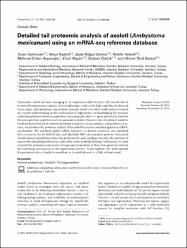Detailed tail proteomic analysis of axolotl (Ambystoma mexicanum) using an mRNA-seq reference database

Göster/
Erişim
info:eu-repo/semantics/openAccessTarih
2017Yazar
Demircan, TuranKeskin, İlknur
Dumlu, Seda Nilgün
Aytürk, Nilüfer
Avşaroğlu, Mahmut Erhan
Akgün, Emel
Öztürk, Gürkan
Baykal, Ahmet Tarık
Üst veri
Tüm öğe kaydını gösterKünye
Demircan, T., Keskin, İ., Dumlu, S. N., Aytürk, N., Avşaroğlu, M. E., Akgün, E. ... Baykal, A. T. (2017). Detailed tail proteomic analysis of axolotl (Ambystoma mexicanum) using an mRNA-seq reference database. Proteomics, 17(1-2). https://dx.doi.org/10.1002/pmic.201600338Özet
Salamander axolotl has been emerging as an important model for stem cell research due to its powerful regenerative capacity. Several advantages, such as the high capability of advanced tissue, organ, and appendages regeneration, promote axolotl as an ideal model system to extend our current understanding on the mechanisms of regeneration. Acknowledging the common molecular pathways between amphibians and mammals, there is a great potential to translate the messages from axolotl research to mammalian studies. However, the utilization of axolotl is hindered due to the lack of reference databases of genomic, transcriptomic, and proteomic data. Here, we introduce the proteome analysis of the axolotl tail section searched against an mRNA-seq database. We translated axolotl mRNA sequences to protein sequences and annotated these to process the LC-MS/MS data and identified 1001 nonredundant proteins. Functional classification of identified proteins was performed by gene ontology searches. The presence of some of the identified proteins was validated by in situ antibody labeling. Furthermore, we have analyzed the proteome expressional changes postamputation at three time points to evaluate the underlying mechanisms of the regeneration process. Taken together, this work expands the proteomics data of axolotl to contribute to its establishment as a fully utilized model.
WoS Q Kategorisi
Q2Scopus Q Kategorisi
Q1Kaynak
ProteomicsCilt
17Sayı
1-2Koleksiyonlar
- Makale Koleksiyonu [300]
- Makale Koleksiyonu [3770]
- Makale Koleksiyonu [355]
- Makale Koleksiyonu [81]
- PubMed İndeksli Yayınlar Koleksiyonu [4223]
- Scopus İndeksli Yayınlar Koleksiyonu [6561]
- WoS İndeksli Yayınlar Koleksiyonu [6621]

















